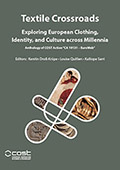Center, Textile Research

Textile Crossroads: Exploring European Clothing, Identity, and Culture across Millennia
Date of this Version
2024
Document Type
Article
Citation
In Textile Crossroads: Exploring European Clothing, Identity, and Culture across Millennia. Anthology of COST Action “CA 19131 – EuroWeb”. Kerstin Droß-Krüpe, Louise Quillien, & Kalliope Sarri, Editors. Zea Books, Lincoln, Nebraska, 2024. DOI: 10.32873/unl.dc.zea.1801
Abstract
This paper argues that we need to focus on past people (rather than just objects) in our narratives and museum displays to engage museum visitors more effectively. It will demonstrate that we can use a combination of well-researched physical and digital prehistoric garment reconstructions to implement more people-centered approaches also used in living history, which bring the past to life and allow visitors to literally come face-to-face with long-dead people. In this way, visitors can relate to past people on an emotional level, which helps them to learn much more about past life than many traditional displays. After outlining how different types of garment reconstructions may help us to people the past, a case study will be presented in which Iron Age garments from Slovenia were examined and reconstructed both physically and by digital means. This not only gives us a better understanding of the textiles, but also allows us to present past people to our present-day audiences in an appealing and relatable manner. By establishing a connection between our present-day audience and past people through these reconstructions, it became possible to tell more relevant and engaging stories about the past.
Included in
Ancient History, Greek and Roman through Late Antiquity Commons, Archaeological Anthropology Commons, Classical Archaeology and Art History Commons, Classical Literature and Philology Commons, Eastern European Studies Commons, European History Commons, European Languages and Societies Commons, Fiber, Textile, and Weaving Arts Commons, History of Science, Technology, and Medicine Commons, Human Geography Commons, Museum Studies Commons, Place and Environment Commons, Social and Cultural Anthropology Commons, Women's Studies Commons


Comments
Copyright © 2024 by the authors.